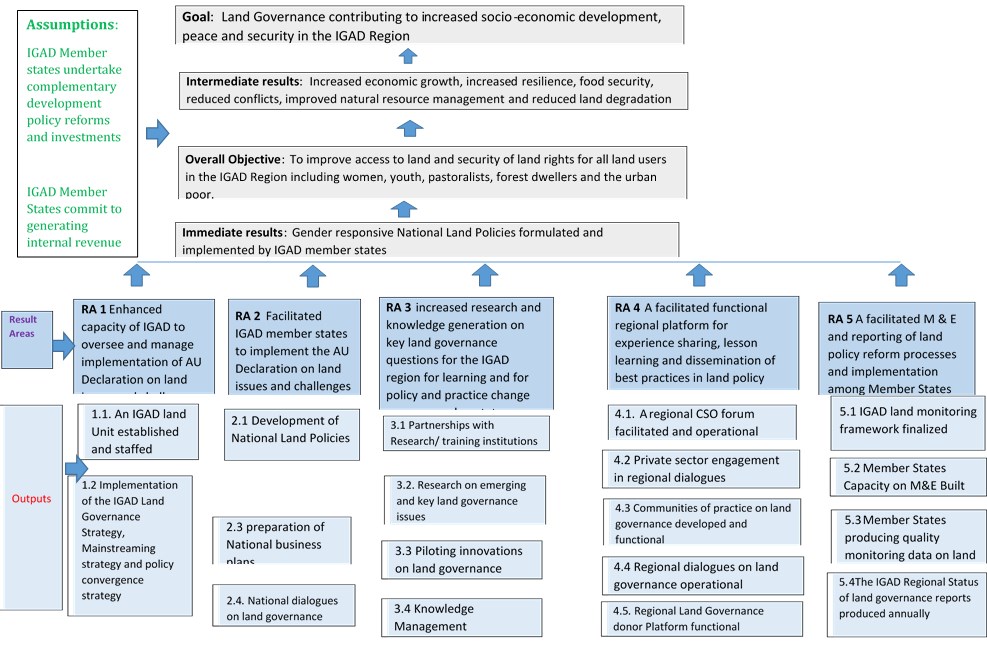Background
Land issues in IGAD region and the challenges to address them are considerable. Nevertheless, the opportunities for improving land governance are also considerable:
- The AU Agenda 2063 adopted in 2013 calls for:
- Sustainable land management practices;
- Reversing land degradation and desertification;
- Equitable access to land by all; and
- Security of land tenure for women
- Other regional and global initiatives for land reform. The African Union’s land policy Framework and Guidelines are in place, and a Second Five-Year Strategic Plan (2018-2022) to implement it is being finalized by the African Land Policy Center (ALPC). The AU Framework and guidelines on Pastoralism implemented by AU-DREA. Other initiatives include the Voluntary Guidelines on the Responsible Governance of Tenure of Land, Fisheries and Forests (VGGT) in the Context of National Food Security; The Sustainable Development Goals (SDGs) provide for land governance in 7 of its 17 goals. This has strengthened the importance of land globally, an advantage to IGAD.
- The current project, “Improving Land Governance in the IGAD Region” 2014 -2018, has provided a good boost to the IGAD Secretariat especially in terms of capacity building, foundational studies and the mainstreaming of land governance in its policies, projects and programs; the on-going study to develop a framework for harmonized land policies in the Region provides an opportunity of member states to formulate and implement their national land policies guided by a shared vision and principles that will facilitate national development while also contributing to regional integration;
- Lower costs and greater efficiency from new technologies. New technologies such as satellites, which are becoming more accessible, have the potential to reduce the cost of surveying while the use of ICT to develop computerized land registries is already improving efficiency and reducing costs and corruption; and
- There are ample opportunities to learn from initiatives within individual member states and from countries within the region. For example, Ethiopia is at the forefront of implementing country-wide programs of mass registration of land rights while Uganda has implemented a computerized land information system that has boosted efficiency, transparency and land-related government revenue.
The Project
The “Improving Land Governance in IGAD Region” project aims at facilitating implementation of the AU Declaration on Land Issues and Challenges in accordance with the Framework and Guidelines on Land Policy in Africa, in order to facilitate access to land and security of land rights for all land users in the IGAD region, especially vulnerable groups such as pastoralists, women and youth.
Goal and Objectives
The goal or expected impact of the business plan is increased socio-economic development, peace and security achieved through implementation of the AU Declaration on Land Policy while the expected outcome is improved access to land and security of land rights for all land users in the IGAD region.
Its main objectives are to:
- Enhance the capacity of the LPI/ALPC and the IGAD Secretariat to facilitate and monitor the implementation of the AU Declaration on land in the region;
- Mainstream land governance issues in programs and activities of the IGAD Secretariat;
- Build capacity of academic institutions in the region to promote and undertake land policy related research;
- Establish a regional platform for knowledge sharing and advocacy aimed at promoting good land governance and land policy convergence among member states;
- Improve partnerships, coordination and alignment of land governance related programs in the IGAD region; and
- Facilitate monitoring and evaluation of land policy reform processes and implementations.
Areas of Intervention
IGAD focuses on 5 key areas of intervention:
- Enhancing further the capacity of IGAD to oversee and manage implementation of AU Declaration on Land Policy;
- Facilitating IGAD Member States to implement the AU Declaration on land issues and challenges in Africa;
- Increasing research and knowledge generation on key land governance questions for the IGAD region for learning, policy and practice change among member states;
- Facilitating a functional regional platform for experience sharing, lesson learning and dissemination of best practices in land policy formulation and implementation among Member states in the IGAD region; and
- Facilitating monitoring & evaluation, and reporting of land policy reform processes and implementation among Member States.
Expected Results from the Interventions
- IGAD Region implementing the AU Declaration on land issues at country level in a coherent and comprehensive manner guided by the 3 Regional land governance frameworks;
- IGAD Member States developing and implementing gender responsive land policies that reflect regional and global frameworks embracing sustainable development and broader social, environmental, economic and political goals. ;
- Research and knowledge generated on key land governance questions in the IGAD region is informing learning for policy and practice change among member states;
- The established regional platform for experience sharing, lesson learning and dissemination of best practices on land governance is furthering regional integration on food security and environmental protection, peace and security and economic development.
- Monitoring and evaluation reports on the status of land governance in IGAD region are informing policy and practice change at member States level.
The Theory of Change for the IGAD Land Governance Project 2019 - 2023


